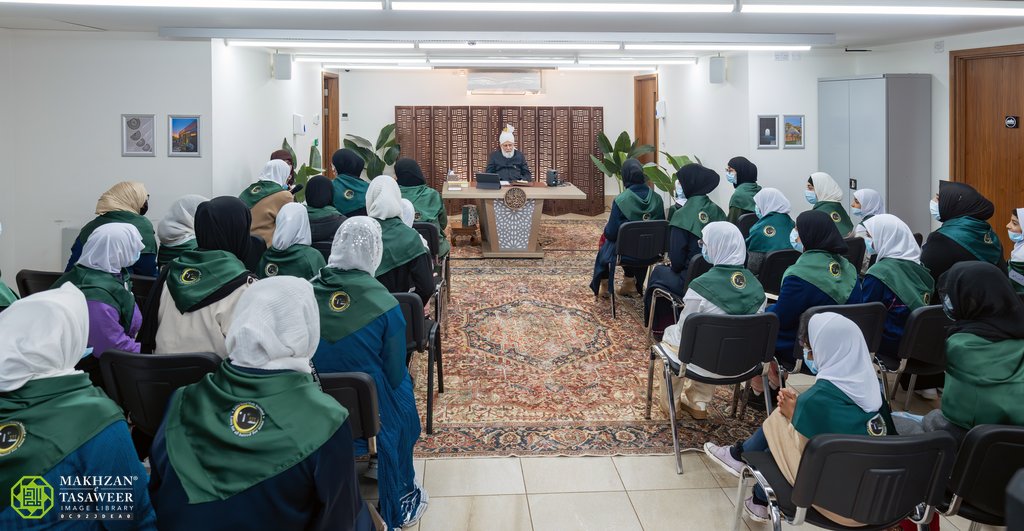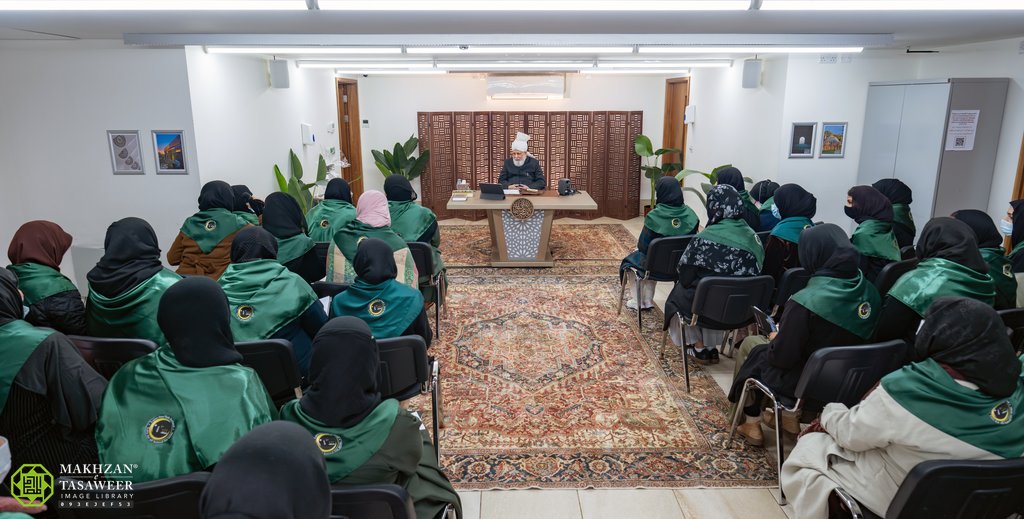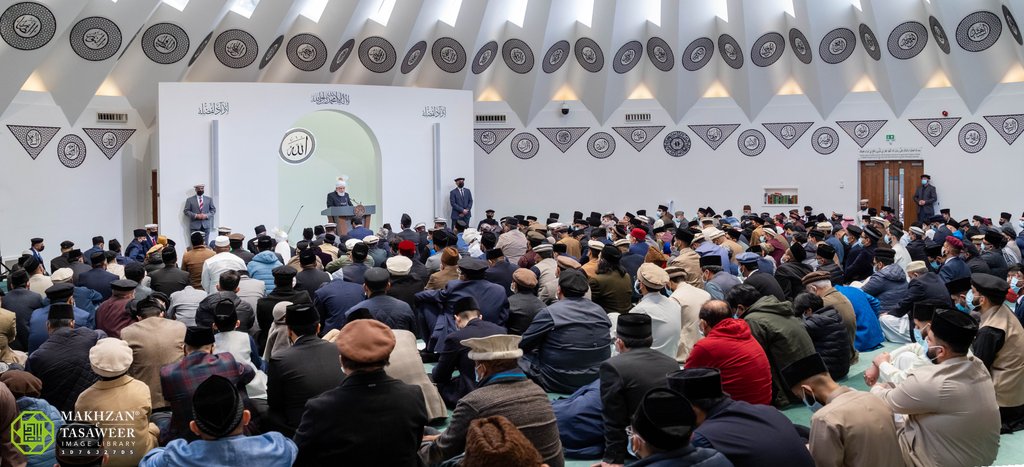
His Holiness, Hazrat Mirza Masroor Ahmad, Grants Audience To Waqifat-E-Nau & Nasirat Of Ireland
“It is very important to suppress one’s anger, and jealousy should not exist at all. They are not only emotions; they are vices. Indeed, they are sins in the eyes of Allah.” – Hazrat Mirza Masroor Ahmad
On 12 October 2025, Hazrat Mirza Masroor Ahmad, the Worldwide Head of the Ahmadiyya Muslim Community, met with members of Waqifat-e-Nau and Nasiratul Ahmadiyya who had come from Ireland at Masjid Mubarak, Islamabad, Tilford.
Waqifat-e-Nau is a scheme within the Ahmadiyya Muslim Community in which parents dedicate their daughters’ lives for the service of Islam, while Nasiratul Ahmadiyya is an auxiliary organisation for Ahmadi Muslim girls aged 7 to 14 that focuses on moral training and education. Both groups play a vital role in nurturing the next generation of Muslim women who aspire to serve humanity and live according to Islamic values.
During the audience, the members had the blessed opportunity to personally introduce themselves and seek guidance from His Holiness on a wide range of matters.
One attendee asked His Holiness whether Ahmadi Muslims are permitted to donate their bodies or organs for medical research. His Holiness explained that, as such scientific research is done in order to benefit humanity and advance medicine it is permissible for an Ahmadi to donate their organs or even their body, provided that after the procedure is completed, the body is returned to the family so that it may be buried.
A young attendee asked His Holiness for guidance on how children can develop the habit of telling the truth, explaining that some find it difficult to be honest with their parents out of fear of being reprimanded.
In response, Hazrat Mirza Masroor Ahmad said:
“If you have made a mistake or done something wrong, then always speak the truth, because a person must be truthful. Allah the Almighty says that truthfulness is essential, for if you do not speak the truth, if you lie or are deceitful, it means that you do not fear Allah. It means you think you can save yourself through lying – in other words, you have made falsehood your god.
“Whereas, if you have done something wrong, then accept it and say that you will not repeat that mistake again. Conversely, if you think that what you did was right then why do you hide it from your parents or your mother? You can openly tell them that I have done such a thing.
“Always hold the conviction that if I lie or speak falsely, then Allah the Almighty will be displeased with me. And [tell yourself], ‘I will not displease Allah the Almighty.’ When you keep this in mind, you will always tell the truth.”
His Holiness continued by narrating a well-known incident from the life of the Holy Prophet (peace and blessings of Allah be upon him). A man once came to the Holy Prophet (peace and blessings of Allah be upon him) and confessed that he suffered from many bad habits and vices, seeking his guidance on how to reform himself. The Holy Prophet (peace and blessings of Allah be upon him) advised him to abandon lying. The man took this counsel and began to speak only the truth. Thereafter, whenever he was about to commit a sin, he would think to himself that if the Holy Prophet (peace and blessings of Allah be upon him) were to ask him about it, he would have to admit it truthfully and would feel ashamed. If he denied it, he would be lying. Each time he faced such a situation, he refrained from wrongdoing until, in time, he gave up all his bad habits altogether.
At the end of his answer, Hazrat Mirza Masroor Ahmad stated:
“Therefore, lying is the greatest evil. Make sure you never speak a lie.”
Another attendee asked His Holiness’ advice about overcoming negative emotions such as anger, jealousy and pride.
His Holiness stated:
“First, make sure you offer all five daily prayers, and in at least one of them, prostrate before Allah and pray that you are not overcome by any negative emotions or harmful thoughts. In addition, whenever such feelings arise, offer Istighfar (the prayer for seeking forgiveness).
“Whenever you feel angry towards someone, offer Istighfar. It is very important to suppress one’s anger, and jealousy should not exist at all. They are not only emotions; they are vices. Indeed, they are sins in the eyes of Allah.
“So you must give up sins, whether it is anger, jealousy, or pride – abandon them all. If you frequently seek Allah’s forgiveness, you will find that you naturally improve and better yourself.”
There after His Holiness stated the importance of humility.
Hazrat Mirza Masroor Ahmad said:
“Do not think of yourself as being something special. That is why the Promised Messiah (peace be upon him) said: ‘Consider yourself to be lower than everyone else, for perhaps by doing so you will find a place in the abode of union with God.’ When you think of yourself as lower than others, then there will be no jealousy, no anger, and no pride – and through this humility, you will find Allah.”
One attendee asked His Holiness regarding the philosophy behind Muslims shaving their heads upon performing the Hajj or Umrah [pilgrimage to Mecca].
In response, Hazrat Mirza Masroor Ahmad stated:
“During Hajj and Umrah, one should shave the head. However, as mentioned in the Holy Qur’an, if someone suffers from an ailment of the scalp, then they may simply trim their hair from the top and not shave it completely.
“In Umrah as well, both options are permissible – one may shave the head entirely or simply cut a small portion of hair. It depends on one’s circumstances. However, shaving the head is generally better, because by doing so, a person expresses that they are totally submissive [to Allah] and totally submits themselves before Allah the Almighty. It is an outward gesture [of complete humility and devotion to God.]”
During the meeting, a member asked His Holiness how one can recognise that Allah the Almighty is pleased with them.
In response, His Holiness spoke of the importance of self-accountability.
Hazrat Mirza Masroor Ahmad stated:
“Do you know which of your actions are good and which are bad? When you do good deeds, Allah says, ‘I am pleased with you.’ But when you commit bad deeds, He says, ‘I am not.’ So, you should judge yourself. If you have told a lie, or are telling lies, then it is a bad thing – Allah will not be happy with you. But if you always speak the truth, no matter the cost, then Allah will be pleased with you. Judge yourself – there is no need for anyone else to judge you.”
Another attendee asked His Holiness about feeling overwhelmed or pressured due to studying, and how one can overcome this by embodying complete trust in Allah the Almighty.
Hazrat Mirza Masroor Ahmad responded:
“When you feel stressed, offer two Nawafil [voluntary prayers] or go into prostration and pray to Allah. Also, give some charity and help those in need. […] Give Sadaqah [alms]. There are a lot of things you can do to help the poor, and doing so will bring satisfaction to your heart. Allah the Almighty says that He accepts the prayers of those who give in charity. Also, recite Durood Sharif [invoking blessings upon the Holy Prophet (peace and blessings of Allah be upon him)] frequently and do not take unnecessary pressure.
“Your foremost duty right now is to study. If you wish to become a doctor, then study with full focus but without stress. At the same time, do not be so relaxed that you become careless – study properly, revise what you have learned at school when you return home. When your foundation becomes strong, you will not need to feel so anxious. Then place your full trust in Allah – say, ‘I have worked hard to the best of my ability, I have prayed to Allah, I have given charity and alms – now I entrust the outcome to You, O Allah.’
“If you trust in Allah in this way, then He never lets that trust go to waste. […] However, if you keep worrying all the time then it will only harm your mind and do no good. Therefore, you must relax; work hard; pray; give to charity and that is all. That is trust in Allah.”
Towards the end of the meeting, an attendee asked His Holiness whether certain souls are burdened by Allah the Almighty because He loves them.
In response, Hazrat Mirza Masroor Ahmad explained:
“The prophets of God are the ones who endure the greatest hardships. Once, a man touched the Holy Prophet (peace and blessings of Allah be upon him) and felt that his body was burning with fever, yet the Prophet (peace and blessings of Allah be upon him) was sitting calmly. The man asked, ‘Do you also fall ill with fever?’ The Holy Prophet (peace and blessings of Allah be upon him) replied, ‘Yes, I experience illness and suffering even more intensely than others – but Allah the Almighty has granted me the strength to bear it. He gives me endurance because He knows I can withstand it. And despite this, I never abandon my duties.’
“The Promised Messiah (peace be upon him) has also written that prophets face immense trials. For instance, all of the Holy Prophet’s sons passed away during his lifetime, yet he bore each loss with patience. He suffered wounds in battle, but never uttered a word of complaint.
“Allah the Almighty grants strength to His chosen ones. Their trials serve as examples for the world – to show […] they too face pain and suffering. These trials exist so that people may see that even those most loved by Allah endure difficulties – yet Allah gives them the power to persevere.”

